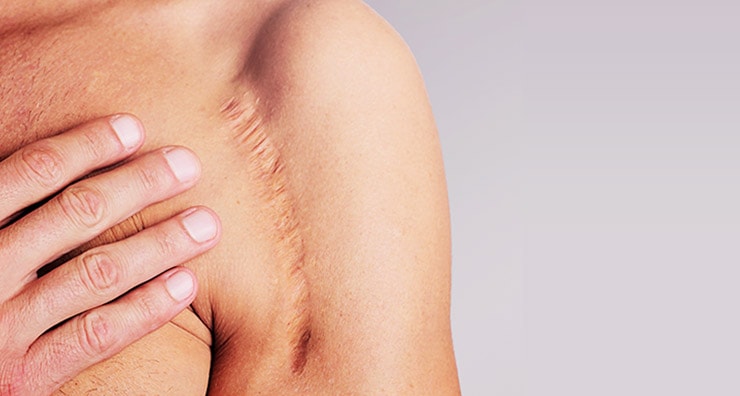
About the Author
Zach is a content writer at LovelySkin. He loves movies, sci-fi novels and helping people improve their skin.
Other Posts by ZachWelcome to LovelySkin.com.

Scars form whenever your skin is damaged, which means any cut, scratch or scrape (unless it’s very minor) can lead to a scar. As a part of your skin’s natural repair process, your body produces new collagen to fill in and mend the wound. Your body produces this scar tissue because it’s more efficient than creating tissue identical to what was damaged, but this quicker healing comes with a tradeoff—scar tissue is a different texture and color than the skin around it, which can lead to a noticeable scar.
Most scars will be flat and pale, but other scars can be raised and reddish in color—these are known as hypertrophic or keloid scars. Other types are scars can be sunken and are most often a result of acne.
Whether you’ve undergone a cosmetic procedure or you just slipped while chopping vegetables, any damage to your skin can result in a scar if you’re not careful. The best way to prevent and minimize potential scarring is to create an ideal environment for the skin to heal. First, keep the wound covered with a breathable bandage until it heals, and don’t let a scab form, because a scab is the first step toward scarring.
After the skin has healed, we recommend Obagi Medical Dermatix Ultra Advanced Scar Treatment, a topical treatment gel with a silicone base that forms a transparent protective barrier. Silicone is great for scar prevention because it protects the treatment area while still allowing oxygen in, which is essential for the healing process. Another great choice for scar treatment is SkinMedica Scar Recovery Gel with Centelline, which combines silicone with a synergistic blend of botanical ingredients to minimize the appearance of pink or red scars.
There’s no easy answer to this one, because it depends on many different factors. A new scar that’s treated correctly can fade in a year or two, but older scars can be much more difficult, if not impossible, to remove. Since sun exposure compounded with a new skin injury can lead to a darkening of scar tissue, our scar prevention product of choice for those with active lifestyles is Biodermis Pro-Sil Sport SPF 15. This silicone treatment comes in a convenient stick formulation and provides broad-spectrum sun protection, so it’s easy to reapply on the go.
Like other kinds of scarring, the best way to treat acne scars is to prevent them in the first place. This means no popping pimples, as this can force bacteria deeper into your skin and make the blemish worse. As soon as you notice red, angry-looking acne scarring, consult with your dermatologist. They can prescribe treatments like Accutane, a potent form of vitamin A that has been shown to effectively reduce acne scarring if treatment is started at the first sign of acne. The bottom line—if you have acne, see your dermatologist right away for treatment so you can avoid acne scarring altogether.
Do you have any other questions about scars? Let us know in the comments below!
Follow us on social networks and be one of the first to learn about sales, giveaways, and free samples
| Mon - Fri | 9 - 5 p.m. CT |
|---|---|
| Sat (chat only) | 9 - 3 p.m. CT |
| Sun / Holidays | Closed |
| Call or Text: | 402-697-1100 |
|---|